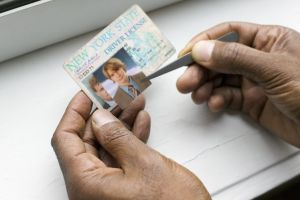Identity Theft
What is Identity Theft?
Identity theft is a serious crime. The damage caused by the theft of personal information can be very extensive, and cleaning up can cost a substantial amount of time and money. In addition, affected persons risk long term damage to their credit and their reputation. Severe consequences of identity theft include lost job opportunities and denial of credit. Some victims have even been falsely accused of crimes they did not commit.
 By conducting everyday activities, consumers leave personal information a thief may want to use to steal their identity. These activities include writing a check, renting a car, applying for credit or charging tickets to a sporting event. These activities reveal personal information such as: your bank and credit card account numbers, your income, your Social Security number, your name, address and telephone number. If stolen, this information may be used to commit identity theft or fraud.
By conducting everyday activities, consumers leave personal information a thief may want to use to steal their identity. These activities include writing a check, renting a car, applying for credit or charging tickets to a sporting event. These activities reveal personal information such as: your bank and credit card account numbers, your income, your Social Security number, your name, address and telephone number. If stolen, this information may be used to commit identity theft or fraud.
Skilled identity thieves use a variety of methods to gain access to your personal information. For example, they may:
- Steal your mail
- Steal your wallet or purse
- Complete a “change of address” form to redirect your mail to another location
- Rummage through your trash
- Collect your information through e-mail or telephone using phishing scams.
Identity Theft Victims: Steps for Immediate Action
If you are a victim of identity theft, take the following steps as soon as possible. Also it is important to keep records of your conversations and copies of all correspondence. Contact your account representative at Harrison County Bank, (304) 745-3342, to secure your bank accounts.
Contact the credit reporting agencies, and place a “fraud alert” on your credit reports. Also, add a “victim’s statement” to your file requesting that creditors contact you before opening new accounts in your name.
If you know or suspect that an account has been tampered with or opened fraudulently in your name, close it immediately. Call and speak to someone in the security or fraud department. You may also wish to follow up in writing. Send all letters by certified mail, return receipt requested.
Filing a “miscellaneous incidents” report at a police station where the identity theft occurred is also an important step. Get a copy of the police report for your records in the case of dealing with creditors who need proof of the crime.
File a complaint with the Federal Trade Commission. You can file a complaint online at: www.consumer.gov/idtheft; call 1-877-438-4338 or write to:
Identity Theft Clearinghouse, FTC
600 Pennsylvania Avenue, NW
Washington, DC 20580
If you know or suspect that your mail has been stolen, contact the United States Postal Service.
Keep detailed records of any identity theft and your efforts to resolve it. Log the date, time and amount of unauthorized transactions, as well as the names of people you have contacted regarding the theft.
Log the date, time, duration and cost of any telephone calls as well as the date and cost of any mailings. Keep copies of all correspondence for your records.
Helpful Contacts in the event of Identity Theft:
- Contact the fraud departments at each of the three credit reporting agencies:
Equifax - 1-800-525-6285, Post Office Box 740241, Atlanta, Georgia 30374-0241
Experian - 1-888-397-3742, Post office Box 9532, Allen, Texas 75013
TransUnion - 1-800-680-7289
Fraud Victim Assistance Division Post Office Box 6790, Fullerton, California 92834-6790. - Federal Trade Commission - 1-877-438-4338, www.consumer.gov/idtheft
Identity Theft Clearinghouse
Federal Trade Commission
600 Pennsylvania Avenue, NW
Washington, D.C. 20580 - United States Postal Service - your local post office.
- Your local police department.
Also Consider:
- Request not to receive further preapproved offers of credit by calling
1-888-5-OPT-OUT - Ask to be removed from national direct mail lists online at: www.dmachoice.org.
- Register with the National Do Not Call Registry by calling 1-888-382-1222 or going online at: http://www.donotcall.gov/.
